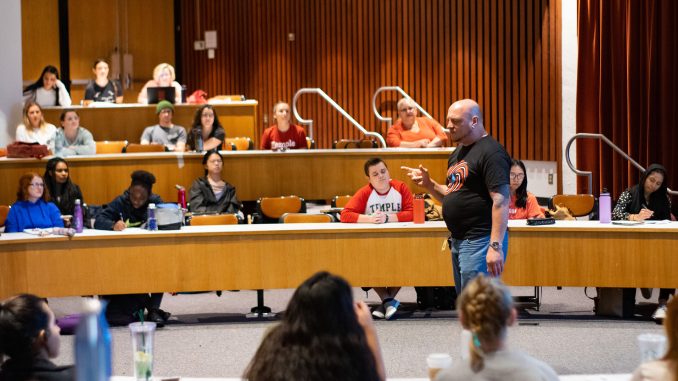
The College of Public Health held a training session on Tuesday for students, staff and faculty to learn how to administer Narcan, an opioid overdose reversal nasal spray.
Elvis Rosado, an education and community outreach coordinator for Prevention Point Philadelphia, conducted the training, which was the first session at Temple open to all students, faculty and staff, and not just those in CPH. There were 160 students and faculty members registered for the training, and about 108 attended, wrote Kate Gallagher, director of CPH’s Office for Clinical Practice and Field Education, in an email to The Temple News.
About 50 of the people who signed up were waitlisted because the training was full, said Pam Mason, assistant director of the office.
“We are planning to try to do these at least twice each semester if the interest keeps up,” Mason said. “We want to make sure all students, faculty and staff get a chance to attend.”
Rosado taught attendees how to recognize the signs of opioid overdose, how Narcan works and how to administer it. He also provided information about Pennsylvania’s standing order for pharmacies to make Narcan available to anyone who requests it, even if they don’t have a prescription. The students and faculty who signed in obtained a certificate stating they’re trained to administer the life-saving nasal spray.
“Anyone who is studying social work or any type of medical field or who’s going to be working with people in general should know about the opioid epidemic in our country,” Rosado said.
“Making sure people understand the barriers to treatment, the cost of addiction, and the general information on how to work with individuals in treatment and recovery is important whether you’re going to be a social worker, a doctor, or whatever the case may be,” he added.
People are misinformed when it comes to substance use disorder, Rosado said, which is why it’s important for students to learn about overdose prevention.
“People might tell someone with addiction ‘you don’t get help because you don’t want to,’” Rosado said. “The reality is, not everyone has easy access to treatment.”
Robyn Reedel, a freshman neuroscience major, said she attended the Narcan training because she’s pursuing a public health career and was personally impacted by the opioid epidemic.
“My cousin died of an overdose, so I thought it was important for me to come and learn about it, especially while living in North Philadelphia,” Reedel said.
There were 1,217 opioid-related deaths in Philadelphia in 2017, according to city data, most of which were concentrated in the North Central East section of the city.
Reedel is going to start carrying Narcan with her, she said, now that she’s been trained.
“It’s important to not to judge people with substance use disorder,” Reedel added. “We should look beyond their problems and try our best to help.”
Shelby Wiseman, a sophomore kinesiology major, said it was beneficial to learn more about the effects of opioid use and how Narcan can help save people’s lives.
“I’m first-aid and CPR trained, and getting training on Narcan is just as important,” Wiseman said. “People should be able to protect and have responsibility within their community.”


Be the first to comment